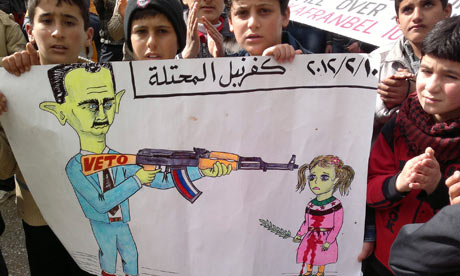Does the responsibility to protect really work?

Leslie Gelb does a nice job framing a question that's been on my mind amidst repeated calls for Western military intervention in Syria:
Faced with evil, Americans always want to be on the side of the angels. So American interventionists, hawks, and human-rights types are banding together, as they did in Libya, to stop President Bashar al-Assad from killing his people. But when interventionists become avenging angels, they blind themselves and the nation, and run dangerously amok. They plunge in with no plans, with half-baked plans, with demands to supply arms to rebels they know nothing about, with ideas for no-fly zones and bombing. Their good intentions could pave the road to hell for Syriansâ??preserving lives today, but sacrificing many more later.[Emphasis mine]
This is an important point that was overlooked in Libya and will probably be overlooked again with respect to Syria: what constitutes protecting people? If you spare 10,000 civilians in a Benghazi or Homs only to set in motion a series of events that winds up killing and displacing as many if not more people over a five or ten year period, have you actually done anything that's morally commendable? Do lives become less important if they're lost gradually instead of in one mass slaughter?
We have been told that the intervention in Libya was a vindication of the Responsibility to Protect - the doctrine that legitimizes military intervention against a state committing atrocities against its own people - but how can we render any moral judgment on what's occurred in Libya? It's not at all clear that the country can be responsibly governed and continued tribal in-fighting could claim as many lives - or more - than any Gaddafi crackdown.
It often looks like advocates of "Responsibility to Protect" want a pass on this, using the overwhelming humanitarian emergency to overwhelm (or brow-beat) those asking for restraint without tackling the broader issue of how their proposed remedy will save lives over the long term. But it won't go away. If the U.S. steps into Syria and starts arming factions and, perhaps, carving out safe havens and humanitarian enclaves with no-fly-zones it could set Syria up for a protracted civil war. If that civil war claims more lives than those lost to date in Assad's brutal crackdown, can we really be said to be "protecting" anyone?
(AP Photo)



